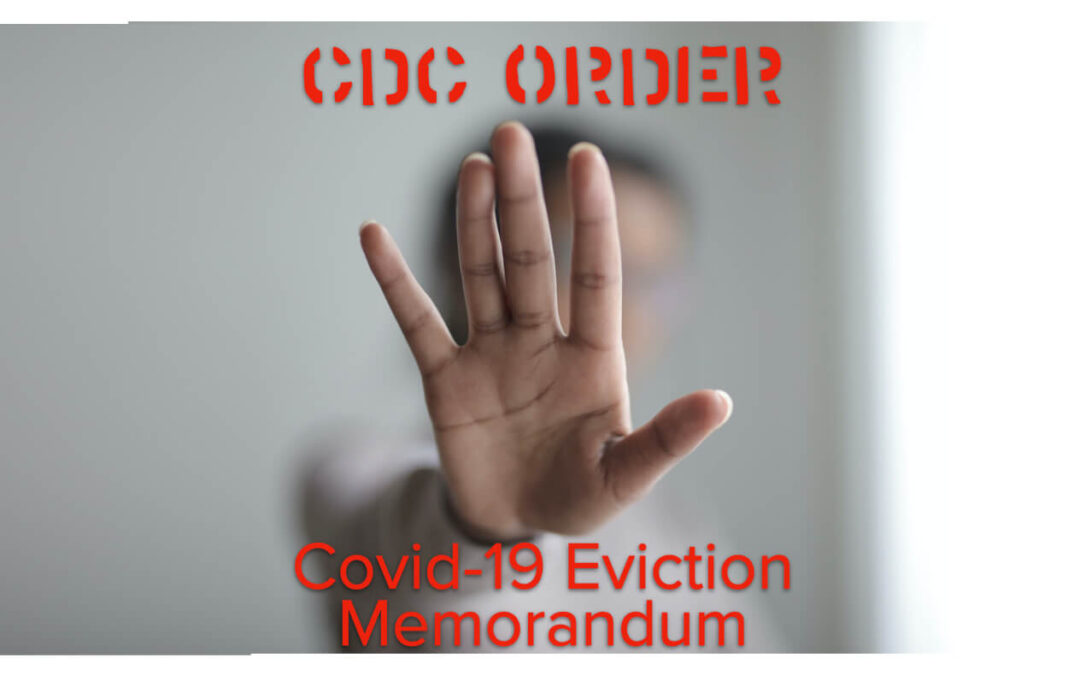To combat the spread of COVID-19, on September 4th, 2020 the Centers for Disease Control (CDC) ordered a temporary halt to residential evictions for qualifying tenants. The order applies to all residential landlords, is effective immediately, and runs through December 31, 2020. The penalties imposed on landlords for violation of the order can be severe, ranging from fines between $100,000-$500,000 or up to one year in prison.
The order protects tenants from being evicted for nonpayment of rent if the tenant provides documentation certifying that the COVID-19 pandemic created a hardship. The CDC order does not apply to foreclosures on home mortgages and is different than previous provisions under the CARES Act which provided a moratorium on evictions for properties receiving federal or federal-related assistance or financing.
While offering tenants protection, the CDC order does not completely immunize a tenant from all eviction efforts by a landlord. A landlord may still evict a tenant for violations unrelated to the nonpayment of rent. Evictions based on the tenant engaging in criminal activity, damaging property, violating lease and/or other contractual obligations unrelated to rent payment, violating building codes or health ordinances, or threatening the health or safety of other residents are still permissible grounds in which a landlord could base an eviction.
REQUIREMENTS FOR TENANT QUALIFICATION
For a tenant to invoke the protections of the order, the CDC has provided a Hardship Declaration Form which must be filled out and submitted to the landlord by each adult listed on the lease or rental agreement. For a tenant to qualify the following five (5) requirements must be certified to under the penalty of perjury:
1) That the tenant has used best efforts to obtain all available government assistance for rent or housing
2) That the tenant either:
i. Expects to earn no more than $99,000 in annual income for Calendar Year 2020 (or no more than $198,000 if filing a joint tax return);
ii. Was not required to report any income in 2019 to the U.S. Internal Revenue Service; or
iii. Received an Economic Impact Payment (stimulus check) pursuant to Section 2201 of the CARES Act
3) That the tenant is unable to pay the full rent or make a full housing payment due to substantial loss of household income, loss of compensable hours of work or wages, lay-offs, or extraordinary out-of-pocket medical expenses;
4) That the tenant is using best efforts to make timely partial payments that are as close to the full payment as the individual’s circumstances may permit, taking into account other nondiscretionary expenses;
5) That the tenant would likely become homeless, need to move into a homeless shelter, or need to move into a new residence shared by other people who live in close quarters because I have no other available housing options
The CDC’s exact language defining these five elements can be found in the a Hardship Declaration Form.
WHAT DOES THIS MEAN FOR LANDLORDS?
Despite the temporary halt to evictions, tenants are still bound to pay rent and it is still permissible for landlords to charge any and all applicable late fees, penalties, and interest associated with missed rental payments.
However, with regard to filing money judgment actions for unpaid rent, in addition to a landlord’s ability to report the tenant to credit reporting agencies, the order is silent.
WHAT SHOULD A LANDLORD DO IF A HARDSHIP WAIVER IF RECEIVED?
Landlords should first understand that the CDC order is not an automatic stay. Tenants must invoke the Order’s protections by submitting the a Hardship Declaration Form to the landlord. Therefore, landlords should not be proactively dismissing or continuing pending evictions which are based on the nonpayment of rent in the absence of receiving such a form.
However, if a Hardship Declaration Form is received by the landlord, the landlord should immediately seek legal counsel due to the severe penalties one faces should the landlord violate the order.
SUMMARY
As is typical of the year 2020, there are still many question marks surrounding the CDC’s order. Many observers have asked whether the CDC has the authority to make such an order, while legal challenges to the order are already under way.
Currently, the legality of the CDC’s order is being challenged by a Virginia landlord in the U.S. District Court for the Northern District of Georgia (HQ of the CDC). In the suit, the landlord is requesting that the court suspend enforcement of the order immediately, claiming that the CDC’s order is “an affront to core constitutional limits on federal power.” Unless and until the court grants this request for a temporary injunction order, the CDC order remains in effect.
In regards to here at home, the Iowa Supreme Court has declined to provide guidance in how issues raised by the CDC order should be addressed, instead, choosing to monitor the situation while informing all judicial officers about the CDC order.

